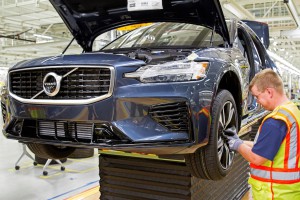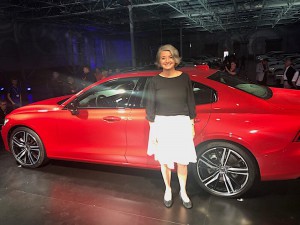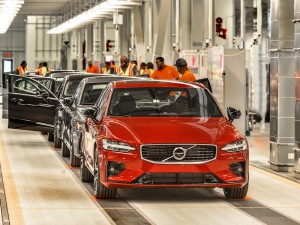
Volvo's new Charleston, South Carolina plant is now up and running with S60 sports sedans rolling down the line. The XC90 comes in a few years.
The new S60 rolling down the line wasn’t the entire story during the official opening of new Volvo Cars factory outside Charleston, South Carolina, as complaints about trade and tariffs nearly stole the show.
With U.N. Ambassador Nikki Haley sitting close by, Karin Olofsdotter, Sweden’s ambassador to the United States, who was invited to speak during the brief ceremony, took the opportunity to send a message to the Trump administration.
Speaking emphatically, she chided the Trump administration for implementing tariffs that inhibit “fair” trade and investment and undermine economic development in both Europe and the United States.
“We believe these things are unfounded and smack of protectionism and will be damaging to the trade balances between Europe and the U.S.,” said Olofsdotter as she dismissed the Trump administration’s contention steel and aluminum from Europe somehow pose a threat to U.S. security.
(Volvo launches car production at first-ever U.S. plant. Click Here for the story.)

Sweden's Ambassador to the U.S. Karin Olofsdotter slammed the Trump administration's tariffs during the opening of Volvo's new plant in South Carolina.
“To say it has anything to do with security is nonsense,” she told reporters after the dedication ceremony inside the new Volvo plant.
“It smacks of protectionism,” she said. “We should work together to get the rest of the world on the trade issue.”
Hakkan Samuelsson, Volvo Cars chief executive officer, who was present for the dedication, said tariffs will certainly could drive up the cost of the S60 sedans that Volvo is preparing to build at the new $1.1 billion plant 38 miles from the center of historic Charleston.
(Click Here for a review of Volvo’s new 2019 V60 wagon.)
Within three years Volvo Cars, which is a wholly-owned subsidiary of China’s Geely Automotive, will have 4,000 employees at the plant near Charleston and 50% of the cars built in the plant will be sold in the U.S. while the other half will be exported to other countries around the world, Samuelsson added after the official ceremony.
Samuelsson said the ultimate solution to the trade tension could be to eliminate all tariffs tacked into cars sold within United States, the European Union and Peoples Republic of China.
“Maybe the solution should be to have no tariffs in the three blocks,” he said.
(To get details on Volvo’s plans to electrify customers and investors, Click Here.)
Meanwhile, reports from Europe indicate that German carmakers and diplomats have actually floated a proposal that would eliminate the 10% tariff on vehicles made in the United States that are exported to 28 countries of the European union. In return, the U.S. would drop all of its tariffs, including the 25% tariff on pickup trucks, which dates back to the 1960s and long has been vigorously defended by Detroit’s automakers.

